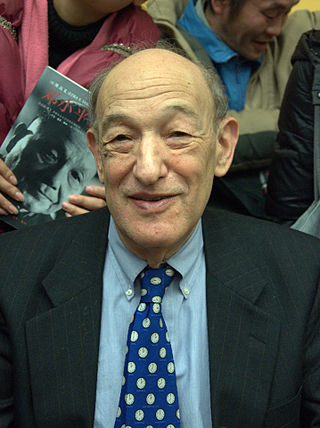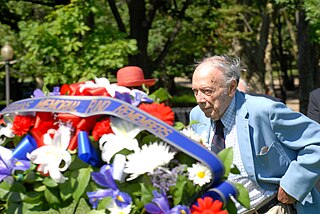
Ezra Feivel Vogel was an American sociologist who wrote prolifically on modern Japan, China, and Korea. He was Henry Ford II Professor of the Social Sciences at Harvard University.

The Autumn Harvest Uprising was an insurrection that took place in Hunan and Jiangxi provinces of China, on September 7, 1927, led by Mao Zedong, who established a short-lived Hunan Soviet.

John King Fairbank was an American historian of China and United States–China relations. He taught at Harvard University from 1936 until his retirement in 1977. He is credited with building the field of China studies in the United States after World War II with his organizational ability, his mentorship of students, support of fellow scholars, and formulation of basic concepts to be tested.

Stanley Abram Karnow was an American journalist and historian. He is best known for his writings on East Asia and the Vietnam War.

Roderick Lemonde MacFarquhar was a British China scholar, politician, and journalist.
Akira Iriye is a historian of diplomatic history, international, and transnational history. He taught at University of Chicago and Harvard University until his retirement in 2005.
Elizabeth J. Perry, FBA is an American scholar of Chinese politics and history at Harvard University, where she is the Henry Rosovsky Professor of Government and Director of the Harvard-Yenching Institute. She is a fellow of the American Academy of Arts and Sciences, a corresponding fellow of the British Academy, a recipient of a Guggenheim Fellowship, and served as Director of Harvard's Fairbank Center for East Asian Research from 1999 to 2003 and as president of the Association for Asian Studies in 2007.
George William Skinner was an American anthropologist and scholar of China. Skinner was a proponent of the spatial approach to Chinese history, as explained in his Presidential Address to the Association for Asian Studies in 1984. He often referred to his approach as "regional analysis," and taught the use of maps as a key class of data in ethnography.
Philip A. Kuhn was an American historian of China and the Francis Lee Higginson Professor of History and of East Asian Languages and Civilizations at Harvard University.
Paul A. Cohen is Edith Stix Wasserman Professor of Asian Studies and History Emeritus at Wellesley College and Associate of the Fairbank Center for Chinese Studies, Harvard University. His research interests include 19th-20th century China; historical thought; American historiography on China.
Ross Terrill is an Australian-born American political scientist and historian. He specializes in the history of China, especially the history of the People's Republic of China. He has made several public appearances in order to testify in front of the United States Congress, and he has also written numerous articles and nine books. For many years he has been a research associate at Harvard's Fairbank Center for Chinese Studies, and recently, he was a visiting professor at the University of Texas at Austin as well as a visiting professor at Monash University in Australia.
Benjamin Isadore Schwartz was an American academic, political scientist, and sinologist who wrote on a wide range of topics in Chinese politics and intellectual history.

The Fairbank Center for Chinese Studies at Harvard University is a post-graduate research center promoting the study of modern and contemporary China from a social science perspective. The center hosts and organizes academic activities, provides research funds for faculty and students, and helps policy-makers and news media to understand modern China. The center sponsors the Edwin O. Reischauer Lectures.
Dwight Heald Perkins II is an American academic, economist, Sinologist and professor at Harvard University. He is the son of Lawrence Bradford Perkins, architect, and Margery Blair Perkins and the grandson of Dwight Heald Perkins, the architect. He married Julie Rate Perkins in 1957 and they have three adult children.
Teng Ssu-yü was a Sinologist, bibliographer, and professor of history at Indiana University. Born in Hunan Province, China, he died in Bloomington, Indiana, after being struck by a car. Teng was trained in China in both the traditional skills of the Confucian scholar and contemporary historical attitudes and techniques. When he came to the United States in 1937, he became a member of the founding generation of American China studies. He wrote not only specialized monographs and bibliographical tools for academics but also such broad studies for introductory students as China's Response to the West.
Albert Feuerwerker was a historian of modern China specializing in economic history and long time member of the University of Michigan faculty. He was the president of the Association for Asian Studies in 1991.
Wu Jiaxiang is a Chinese scholar, writer, and public intellectual. Wu once served in various political roles in the Chinese government. He is visiting scholar at the Fairbank Center for East Asian Research at Harvard University.
Merle Goldman is an American historian and sinologist of modern China. She is Professor Emerita of History, Boston University, especially known for a series of studies on the role of intellectuals under the rule of Mao Zedong and on the possibilities for democracy and political rights in present-day China.
Ronald Suleski is a historian, anthropologist and author specializing in East Asia. He has been the longest serving president of the Asiatic Society of Japan, served on the National Committee on US-China Relations and associated with the Harvard University's East Asian research center. He is currently serving as the Director of the Rosenberg Institute at Suffolk University in Boston, Massachusetts, United States.

Report on an Investigation of the Peasant Movement in Hunan or Inquiry into the Peasant Movement of Hunan of March 1927, often called the Hunan Report, is one of Mao Zedong's most famous and influential essays. The Report is based on a several month visit to his home countryside around Changsha, capital of Hunan in early 1927. The Report endorses the violence that had broken out spontaneously in the wake of the Northern Expedition, makes a class analysis of the struggle, and enthusiastically reports the "Fourteen Great Achievements" of the peasant associations (农民协会).






